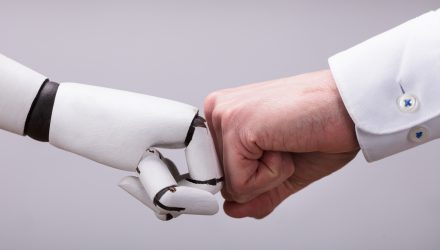Nevertheless, in an increasingly interconnected global economy, a disruption in one area of the globe will inevitably affect others.
“Serious disruption to these very globalized supply chains would raise the cost of building robots, which would be bad news for the pace of adoption. So we’ll have to watch closely how this plays out,” J.H. Cullum Clark, Director at Bush Institute-SMU Economic Growth Initiative, said.
Furthermore, Clark warned of other pitfalls, including new destabilizing dynamics into geopolitics and national security, white collar disruption and productivity gains that may not impact low-skilled occupations.
Investors who are interested in gaining exposure to the potential growth in robotics, automation and artificial intelligence can look to something like the ROBO Global Robotics & Automation Index ETF (NYSEArca: ROBO).
“As we’re in the very early stages of adoption, companies that lead in providing A.I. tools will very likely grow faster than most public companies. History suggests that the stock market tends to under-appreciate the scale of the opportunity enjoyed by leading companies in the early stage of adoption of new technologies,” Clark said.
ROBO’s underlying index has exhibited a proven track record, is backed by an expert team and exclusively focuses on robotics. It has also been outperforming major benchmark indices and emerging competitors. Potential investors may look to ROBO to capitalize on solutions for emerging global trends, from decreasing productivity growth to demographic shifts.
Financial advisors who are interested in learning more about robotics and artificial intelligence investments can watch the webcast here on demand.
